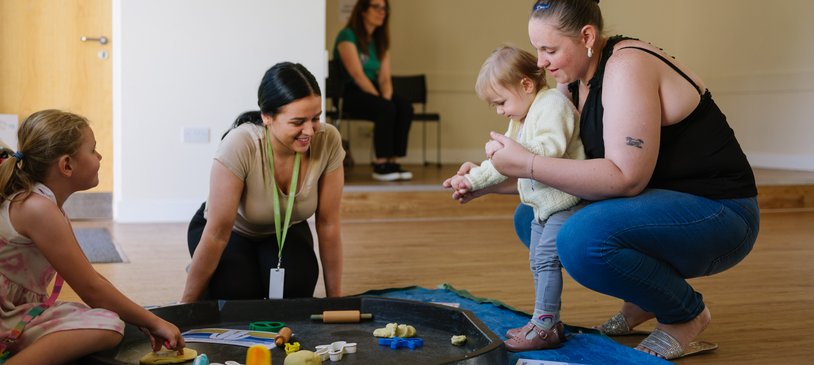Haymills CC, based in Yardley, Birmingham, wanted to implement the First Words Together (FWT) programme for parents and children attending an already popular community group - Little Sheep Stay and Play.
However, due to space and staffing limitations, they couldn’t run a separate FWT group. Instead, they decided to integrate the FWT programme into their regular stay and play sessions.
Haymills CC organises two stay and play sessions at their Little Sheep setting, which takes place in an open-plan, pack-away church hall.
Previously, an Early Years Alliance representative delivered the FWT programme during the stay and play sessions. However, the staff noticed that the busy environment during these sessions didn’t optimise FWT delivery, as it was confined to a specific area of the church hall and was often overshadowed by the hustle and bustle of the other activities taking place across the room. After discussions, they decided to trial a holistic approach by delivering FWT to the entire group of attendees at the setting.
At Little Sheep stay and play, parents are invited to sign up for the programme. This allows attendees to choose whether they want to participate in FWT or simply engage in regular play and stay activities. The session begins at 10AM, with parents signing in during the next half-hour upon arrival. Children have access to various activities set up by practitioners, all of which relate to the weekly talking tip. Practitioners actively engage with parents, caregivers, and children, promoting both current and previous talking tips.
Around 11:30AM, snack time is indicated for the children. Parents are encouraged to participate in this activity, aligning with the face-to-face talking tip. At approximately 11:45AM, families gather in a designated area at the back of the hall. Those who opted out of the FWT programme leave and the remaining group listens to a shared story (often the gifted book) and participate in songs. Families receive parent talking tips and the free book, while practitioners also share other relevant messages related to young children and families in the local community.
Like a standard FWT programme, the success of the Little Sheep group is evaluated based on parental feedback. Parents assess themselves against specific criteria at the programme’s start and again after the fifth session.
“My child is 22 months and is not saying much. He is an only child, and I was worried about his speaking. I have benefited from these sessions because I like the tips and they have been helping me and his dad to help him at home with his communication.”
Parent comment from Little Sheep Stay and Play
The evidence from observations by the National Literacy Trust, practitioner feedback, and parent views supports the integration of the talking tip into all activities during the session.
Little Sheep Stay and Play ensured that families not enrolled in the FWT programme could still access this crucial information. The staff played a vital role in emphasising the importance of these tips to parents and caregivers, modelling them when they noticed a decline in engagement between parent and child, regardless of enrolment in the programme.
